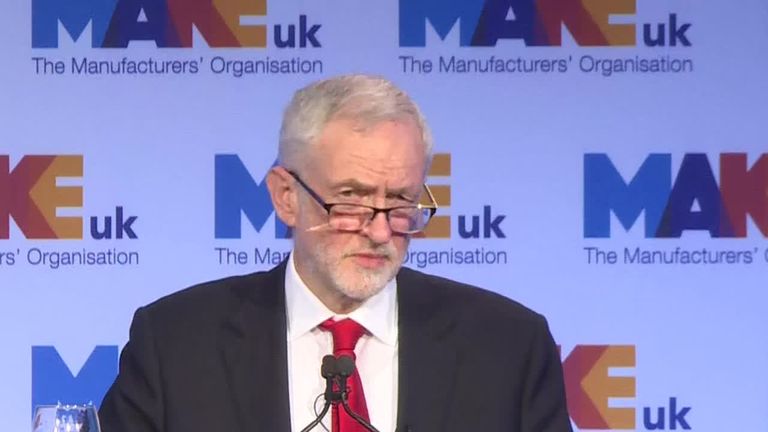Labour to consult on extending voters' rights to force out quitting MPs
The party will look at whether constituents should be able to oust MPs if they resign from a party under which they were elected.
Wednesday 20 February 2019 08:28, UK
Labour has responded to the resignation of eight of its MPs by considering plans to allow voters to force MPs from their seats if they quit a party.
In a defiant response to the defection of the MPs to a new Independent Group in parliament, Labour has proposed extending the rights of constituents to recall their MPs.
Under current laws, constituents can petition to recall their local MP if they have been convicted of a criminal offence and sentenced to a prison term; if they are suspended from the House of Commons for two weeks; or if they are found guilty of having made false or misleading expenses claims.
An MP will lose their seat if 10% of eligible constituents sign a recall petition, although they are not barred from standing in a resulting by-election.
Labour now want to look at whether the right of constituents to petition to recall their MP should be extended to cases where an MP resigns from a party under whose banner they were elected to parliament.
Chuka Umunna, Gavin Shuker, Mike Gapes, Angela Smith, Chris Leslie, Luciana Berger and Ann Coffey all resigned from Labour on Monday, having stood as their party's candidates at the 2017 general election.
Enfield North MP Joan Ryan joined their number late on Tuesday, claiming the party had "become infected with the scourge of anti-Jewish racism".
The MPs have resisted calling by-elections in their constituencies, despite Labour shadow chancellor John McDonnell saying it would be the "honourable thing for them to do".
Mr Leslie said a series of by-elections are "absolutely not what is needed right now" with the UK on the brink of leaving the EU.
Mr Umunna also shared a Twitter post by Mr Corbyn in 2010 which said people vote for for their MP "rather than a party/ leader".
He wrote: "We don't always agree on the big issues but on this the Labour leader is right.
"Not sure the official or unofficial spokespeople will be RTing this so thought I'd do so for them."
In 2014, when Douglas Carswell and Mark Reckless defected from the Conservative Party to UKIP, they both called - and subsequently won - by-elections in their constituencies.
However, defecting MPs have historically not always triggered a new parliamentary contest in their seat.
Labour's consultation on whether to extend the right to recall, which will be viewed as a direct challenge to the eight MPs and any other possible defectors, will form part of a programme of political reform under a Labour government.
The party said this will "culminate in a 'Constitutional Convention' to radically democratise politics and power in our country".
Jon Trickett, Labour's shadow minister for the Cabinet Office, said: "Power comes from the people but for too long the overwhelming majority have been shut out.
"That's why trust in politics and in elites is rightly falling.
"Communities should not have to wait for up to five years to act if they feel their MP is not properly representing their interests, especially with the restrictions of the Fixed-term Parliaments Act.
"This proposed reform has the dramatic potential to empower citizens and will be one of many measures the Labour Party is planning to consult on and announce that will change the way politics in this country is done".
Labour deputy leader Tom Watson has this week warned more groups of MPs could desert the party.
Other Labour MPs have echoed the eight's unhappiness with Labour leader Jeremy Corbyn's stance on Brexit and handling of antisemitism allegations.
There have also been suggestions Conservative MPs could quit their party and join the new Independent Group.
Last year, the DUP's Ian Paisley Jr was the first MP to face a recall petition in UK parliamentary history after he was suspended from the Commons for failing to declare two holidays paid for by the Sri Lankan government.
He kept his seat after a petition failed to reach the number of signatures required to oust him from parliament.






